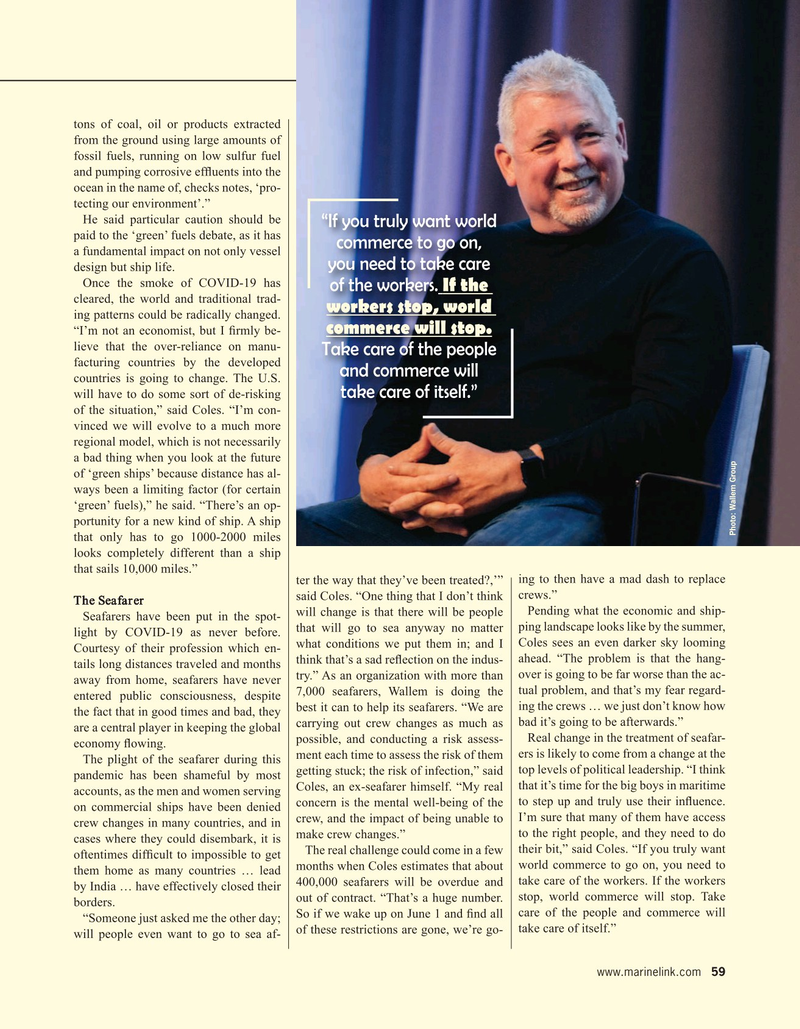
Page 59: of Maritime Reporter Magazine (May 2020)
Fleet Management
Read this page in Pdf, Flash or Html5 edition of May 2020 Maritime Reporter Magazine
tons of coal, oil or products extracted from the ground using large amounts of fossil fuels, running on low sulfur fuel and pumping corrosive effuents into the ocean in the name of, checks notes, ‘pro- tecting our environment’.”
He said particular caution should be “If you truly want world paid to the ‘green’ fuels debate, as it has commerce to go on, a fundamental impact on not only vessel you need to take care design but ship life.
Once the smoke of COVID-19 has of the workers. If the cleared, the world and traditional trad- workers stop, world ing patterns could be radically changed. commerce will stop. “I’m not an economist, but I frmly be- lieve that the over-reliance on manu-
Take care of the people facturing countries by the developed and commerce will countries is going to change. The U.S. take care of itself.” will have to do some sort of de-risking of the situation,” said Coles. “I’m con- vinced we will evolve to a much more regional model, which is not necessarily a bad thing when you look at the future of ‘green ships’ because distance has al- ways been a limiting factor (for certain ‘green’ fuels),” he said. “There’s an op- portunity for a new kind of ship. A ship
Photo: Wallem Group that only has to go 1000-2000 miles looks completely different than a ship that sails 10,000 miles.” ter the way that they’ve been treated?,’” ing to then have a mad dash to replace said Coles. “One thing that I don’t think crews.” the Seafarer will change is that there will be people Pending what the economic and ship-
Seafarers have been put in the spot- light by COVID-19 as never before. that will go to sea anyway no matter ping landscape looks like by the summer, what conditions we put them in; and I Coles sees an even darker sky looming
Courtesy of their profession which en- tails long distances traveled and months think that’s a sad refection on the indus- ahead. “The problem is that the hang- away from home, seafarers have never try.” As an organization with more than over is going to be far worse than the ac- entered public consciousness, despite 7,000 seafarers, Wallem is doing the tual problem, and that’s my fear regard- the fact that in good times and bad, they best it can to help its seafarers. “We are ing the crews … we just don’t know how carrying out crew changes as much as bad it’s going to be afterwards.” are a central player in keeping the global possible, and conducting a risk assess- Real change in the treatment of seafar- economy fowing.
The plight of the seafarer during this ment each time to assess the risk of them ers is likely to come from a change at the pandemic has been shameful by most getting stuck; the risk of infection,” said top levels of political leadership. “I think
Coles, an ex-seafarer himself. “My real that it’s time for the big boys in maritime accounts, as the men and women serving on commercial ships have been denied concern is the mental well-being of the to step up and truly use their infuence. crew changes in many countries, and in crew, and the impact of being unable to I’m sure that many of them have access cases where they could disembark, it is make crew changes.” to the right people, and they need to do
The real challenge could come in a few their bit,” said Coles. “If you truly want oftentimes diffcult to impossible to get them home as many countries … lead months when Coles estimates that about world commerce to go on, you need to by India … have effectively closed their 400,000 seafarers will be overdue and take care of the workers. If the workers out of contract. “That’s a huge number. stop, world commerce will stop. Take borders.
So if we wake up on June 1 and fnd all care of the people and commerce will “Someone just asked me the other day; of these restrictions are gone, we’re go- take care of itself.” will people even want to go to sea af- www.marinelink.com 59

 58
58

 60
60
